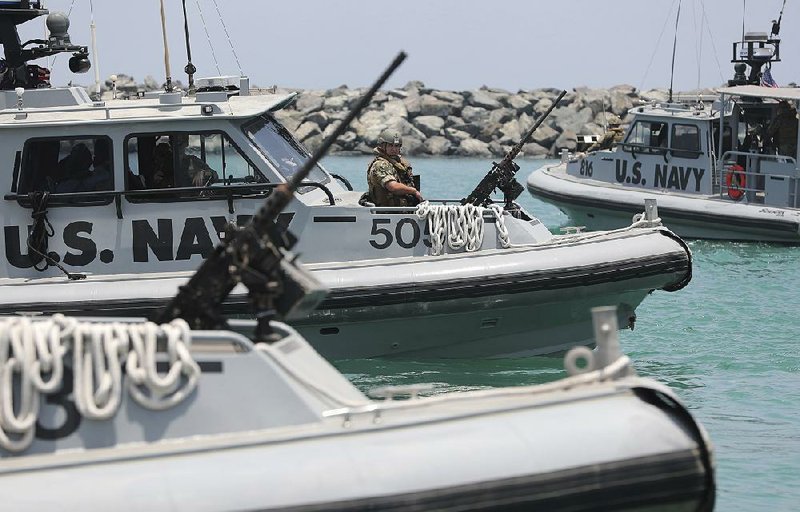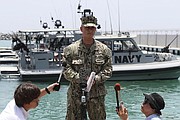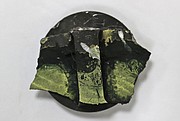TEHRAN, Iran -- Iran's state-run Islamic Republic News Agency said today that the country's Revolutionary Guard has shot down a U.S. drone. The U.S. military declined to immediately comment.
The news agency said the drone was hit when it entered Iranian airspace near the Kouhmobarak district in southern Iran's Hormozgan province.
Citing the paramilitary Revolutionary Guard, the news agency identified the drone as an RQ-4 Global Hawk.
Capt. Bill Urban, a U.S. Central Command spokesman, said: "There was no drone over Iranian territory." He declined to comment further.
The reported shoot-down comes amid heightened tensions between Iran and the U.S.
On Wednesday, a U.S. Navy explosives expert said the limpet mines used to attack a Japanese-owned oil tanker near the Strait of Hormuz last week bore "a striking resemblance" to mines seen in Iran.
Iran has repeatedly denied being involved in the June 13 attacks on the Norwegian-owned Front Altair and the Japanese tanker Kokuka Courageous. The attacks were carried out as Japan's Prime Minister Shinzo Abe was on a high-stakes diplomatic visit to Tehran.
The comments by Cmdr. Sean Kido came as sailors showed reporters pieces of debris and a magnet that the Navy says was used to attach an unexploded mine to the hull of the Kokuka Courageous. U.S. authorities say the materials were left behind by Iran's Revolutionary Guard when it retrieved the unexploded mine after the attack in the Gulf of Oman.
Iran, which previously used mines against oil tankers in the crucial waterway in the 1980s, has also not acknowledged retrieving the mine.
Kido stressed that the damage to the Kokuka Courageous was "not consistent with an external flying object hitting the ship," as the ship's owner has contended happened during the attack.
"The damage we observed is consistent with a limpet mine attack," Kido said.
Meanwhile, rockets struck near an oil-drilling site in Iraq's southern Basra province early Wednesday, including one that hit inside a compound housing energy giant Exxon Mobil and other foreign oil companies, Iraqi officials said. Three local workers were injured, one seriously, the officials said.
Forty Exxon Mobil staff members were evacuated, Iraqi security officials said.
Exxon Mobil, based in Irving, Texas, did not respond to a request for comment. In May, it evacuated staff members from the West Qurna 1 oil field in Basra province.
No one claimed responsibility for Wednesday's attacks, and Iraqi oil exports were unaffected.
Iraq has worried about getting caught between the U.S. and Iran. The country hosts more than 5,000 U.S. troops and is home to powerful Iranian-backed militias, some of whom want those U.S. forces to leave.
TENSIONS HIGH
The attacks come against the backdrop of heightened tensions after President Donald Trump's decision to withdraw from Tehran's nuclear deal with world powers a year ago.
Iran recently has quadrupled its production of low-enriched uranium and threatened to boost its enrichment closer to weapons-grade levels, trying to pressure Europe for new terms to the 2015 deal.
In recent weeks, the U.S. has sped an aircraft carrier to the Middle East and deployed additional troops to the tens of thousands already in the region. Mysterious attacks also have targeted oil tankers as Iranian-allied Houthi rebels launched bomb-laden drones into Saudi Arabia.
All of this has raised fears that a miscalculation or further rise in tensions could push the U.S. and Iran into an open conflict, some 40 years after Tehran's Islamic Revolution.
The U.S. Navy briefed foreign journalists Wednesday at a 5th Fleet base near Fujairah, an Emirati port city about 130 miles northeast of the capital, Abu Dhabi. They showed journalists debris recovered from the Kokuka Courageous after the attack, including aluminum and composite metals.
They also displayed a magnet -- one of six apparently used to attach the unexploded limpet mine to the ship's hull. Sailors said it took two men and a crowbar to pry it off the ship.
Limpet mines take their name from a mollusk that clings to rock and have been used by a variety of militaries. The mines can be attached by magnets and nails. The Kokuka Courageous also bore nail holes near where Iranian forces took the unexploded mine, the sailors said.
They showed reporters a photo of a limpet mine on display in Iran, which they said resembled the one used on the ship. The 90-pound conical-shaped mine had a sign next to it saying it was produced by a research company affiliated with the Revolutionary Guard, a paramilitary group that answers only to Supreme Leader Ayatollah Ali Khamenei.
"The limpet mine that was used does bear a striking resemblance to that which has been publicly displayed in Iranian military parades," Kido said. "There are distinguishing features."
Iran's mission to the U.N. declined to comment, referring reporters to remarks by Iranian Defense Minister Gen. Amir Hatami, who said allegations that Tehran was behind the tanker attacks were "totally a lie" meant to tarnish Iran's image.
According to the semi-official Fars news agency, Hatami questioned the authenticity of a grainy video released by the U.S. after the attack that purports to show Revolutionary Guard forces removing the unexploded mine.
"The date and the location shown in the footage have not been authenticated," he said. The Americans "can show any footage ... but it cannot be used as evidence."
The mines were placed above the vessel's water line. One exploded, punching through the double-hulled ship and sparking a brief fire. The mines' placement makes it "appear that the intention was not to sink the vessel," Kido said.
Authorities also found a handprint and fingerprints, he said. "We recovered biometric information ... which can be used to build a criminal case to hold the individuals responsible accountable." He did not offer more details.
The second vessel targeted in the attack, the Norwegian-owned Front Altair, caught fire and sent black smoke into the air that was visible from space by satellites. Kido did not explain why the U.S. had no immediate evidence from that vessel. Both are now anchored off the eastern coast of the United Arab Emirates.
He also declined to discuss an earlier May 12 attack on four oil tankers off the coast of Fujairah, near the U.S. base. The U.S. has also blamed that attack on Iranian limpet mines.
WAR WORRIES PERSIST
As tensions rise, worries have increased that hard-liners in the U.S. and Iran want to provoke war.
"We know that there are three [main] groups that want to provoke Iran and the United States into a military confrontation: hard-liners in Iran, radicals in the United States, and Saudi Arabia and Israel," said Farzad, 48, an engineer at a power plant in Iran's Bushehr port on the gulf.
Farzad said he believes that Khamenei, and Trump are being egged on by more hawkish aides, including officials in Iran's Revolutionary Guard and U.S. national security adviser John Bolton.
But if Iran carried out last week's tanker attacks, it is not because of pressure from the United States, said Farzad. "It is because of the economic and political benefit some groups in Iran would have if there is a war. Such acts are harmful to Iranians and for the government as a whole."
Farzad, like other Iranians interviewed, spoke without using his full name so he could discuss the Iranian government, which often represses dissent.
"It doesn't make any sense that Iran would carry out such a mission since, before anything, it would sabotage its own reputation in the region," said Leila, 31, an employee at a food distribution company in the Iranian capital.
Leila said she thinks it's more likely that either Saudi Arabia or Israel, Iran's chief foes in the region, "planned the attack and faked evidence" to "show the world that Iran is untrustworthy."
She noted that the attack happened "right on the day that Iran was hosting Shinzo Abe and telling him that they only want the [nuclear deal] back."
Even as some Iranians worried about military action, others said they understood Iran's decision to reduce its commitments under the nuclear agreement, which had promised Iran relief from U.S. sanctions in return for adhering to nuclear restrictions.
Now, with a near-total U.S. embargo in place, Iran's economy is suffering, oil sales are down, and the pact's other signatories, including European nations, have struggled to maintain investments in Iran.
Their country is isolated, these Iranians said, and has few options other than to mount a strong response.
"Maybe if this nuclear problem had never started, things would not have escalated to this point," said Fahimeh, a private-sector employee in Tehran, referring to Iran's original pursuit of nuclear energy. "But now that we are here, I can understand why [Iranian] officials have no better option than to threaten uranium enrichment."
Farzad, the engineer, said he believes Iran's threats to increase its enriched uranium "are more severe than the actual steps they are taking in practice."
Still, he said, "this is a very dangerous move."
"A show like this only legitimizes the American provocations," he said.
Information for this article was contributed by Jon Gambrell, Qassem Abdul-Zahra, Amir Vahdat and staff members of The Associated Press; and by Erin Cunningham of The Washington Post.
A Section on 06/20/2019


